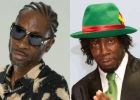The entire Caribbean community is in mourning as one of our musical icon pass on to the other life.
Soca icon Arrow, whose real name is Alphonsus Celestine Edmund Cassell, lost his battle with brain cancer. Arrow passed away peacefully on Wednesday at his home in Montserrat.
Urban Islandz send condolence to his family and friends, Arrow will be missed by all Caribbean music fans around across the globe.
Lets look a little into the life of the Legend behind the song “Hot Hot Hot.”
Born into a musical family on Nov. 16, 1949, music was in Arrow’s blood. He was greatly influenced by longtime king of calypso, the Mighty Sparrow, in the 1970s. Arrow eventually took the genre’s crown and was soon named Monterrat’s calypso king four times before embarking on an international career. He toured Africa, Europe, Japan and the US in the 1980s. Making a big name for himself, Arrow was considered Montserrat’s most famous citizen and even had his face on telephone cards in the country.
Cassell began singing at school and by 1971 had been crowned the Calypso Monarch of Montserrat. A series of hits followed, as he built his reputation within the Leeward Islands calypso fraternity, including “On Target” (1974), “Instant Knockout” (1983) and “Double Trouble” (1983). Combining R&B and salsa, he enjoyed his first Caribbean hit in 1983 with “Hot Hot Hot”, its popularity later translating into international sales when it became the official theme tune to the Mexico World Cup football tournament.
Since that time he has continued to experiment, embracing urban north American rhythms from hip-hop, as well as those associated with African and world cultures, and writing lyrics that, in a traditional Trinidadian fashion, invite the audience to an ever-higher degree of physical rapture. It is a combination that requires a deft hand and yet is accomplished with a natural, easy feel. The best examples are the Latin fusion of “Party Mix” (1984), the Guadeloupe-influenced “Zouk Me’ (1990) and even a rock-tinged set, in 1988″s Knock Dem Dead (with guitar provided by Chris Newland).



